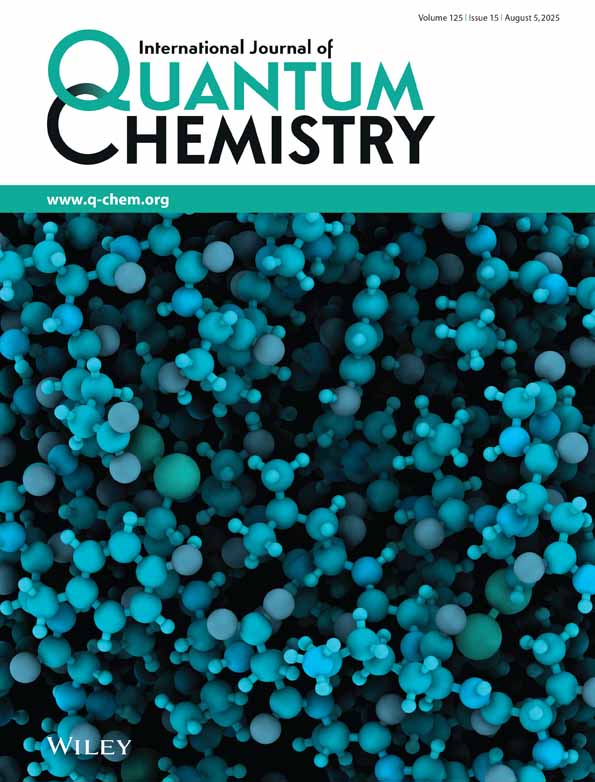Quantum hydrodynamics: Mixed states, dissipation, and a new hybrid quantum-classical approach
Corresponding Author
Irene Burghardt
Département de Chimie, Ecole Normale Supérieure, 24 rue Lhomond, F-75231 Paris cedex 05, France
Département de Chimie, Ecole Normale Supérieure, 24 rue Lhomond, F-75231 Paris cedex 05, FranceSearch for more papers by this authorKlaus B. Møller
Department of Chemistry, Technical University of Denmark, DK-2800 Kgs. Lyngby, Denmark
Search for more papers by this authorGérard Parlant
Laboratoire de Structure et Dynamique des Systèmes Moléculaires et Solides, Université Montpellier II, F-34095 Montpellier, France
Search for more papers by this authorLorenz S. Cederbaum
Theoretische Chemie, Universität Heidelberg, Im Neuenheimer Feld 229, D-69120 Heidelberg, Germany
Search for more papers by this authorEric R. Bittner
Department of Chemistry, University of Houston, Houston, Texas 77204, USA
Search for more papers by this authorCorresponding Author
Irene Burghardt
Département de Chimie, Ecole Normale Supérieure, 24 rue Lhomond, F-75231 Paris cedex 05, France
Département de Chimie, Ecole Normale Supérieure, 24 rue Lhomond, F-75231 Paris cedex 05, FranceSearch for more papers by this authorKlaus B. Møller
Department of Chemistry, Technical University of Denmark, DK-2800 Kgs. Lyngby, Denmark
Search for more papers by this authorGérard Parlant
Laboratoire de Structure et Dynamique des Systèmes Moléculaires et Solides, Université Montpellier II, F-34095 Montpellier, France
Search for more papers by this authorLorenz S. Cederbaum
Theoretische Chemie, Universität Heidelberg, Im Neuenheimer Feld 229, D-69120 Heidelberg, Germany
Search for more papers by this authorEric R. Bittner
Department of Chemistry, University of Houston, Houston, Texas 77204, USA
Search for more papers by this authorAbstract
The formulation of quantum hydrodynamics for mixed states provides a complement, in a quantum-statistical context, to its pure-state “Bohmian mechanics” analogue. We summarize our recent work in this area, focusing on two key aspects. We first describe the formulation of a generalized hydrodynamic force, which includes the effects of thermal fluctuations and “quantum fluctuations” and thus determines the time evolution under the influence of dissipation. Second, we introduce a mixed hydrodynamic–Liouville space representation in terms of partial moments, as applied in the context of coupled electronic states and mixed quantum-classical dynamics. © 2004 Wiley Periodicals, Inc. Int J Quantum Chem, 2004
REFERENCES
- 1 Lopreore, C. L.; Wyatt, R. E. Chem Phys Lett 2000, 325, 73.
- 2
Holland, P. R.
The Quantum Theory of Motion;
Cambridge University Press:
New York,
1993.
10.1017/CBO9780511622687 Google Scholar
- 3 Burghardt, I.; Cederbaum, L. S. J Chem Phys 2001, 115, 10303.
- 4 Burghardt, I.; Cederbaum, L. S. J Chem Phys 2001, 115, 10312.
- 5 Maddox, J. B.; Bittner, E. R. J Chem Phys 2001, 115, 6309.
- 6 Maddox, J. B.; Bittner, E. R.; Burghardt, I. Int J Quantum Chem 2002, 89, 313.
- 7 Maddox, J. B.; Bittner, E. R. Phys Rev E 2002, 65, 026143.
- 8 Maddox, J. B.; Bittner, E. R. J Phys Chem B 2002, 106, 7981.
- 9 Burghardt, I.; Møller, K. B. J Chem Phys 2002, 117, 7409.
- 10 Burghardt, I.; Parlant, G. J Chem Phys 2004, 120, 3055.
- 11 Moyal, J. E. Proc Cambridge Philos Soc 1949, 45, 99.
- 12 Fröhlich, H. Physica 1967, 37, 215.
- 13 Irving, J. H.; Zwanzig, R. W. J Chem Phys 1951, 19, 1173.
- 14
Yvon, J.
J Phys Lett
1978, 39,
L-363.
10.1051/jphyslet:019780039021036300 Google Scholar
- 15 Lill, J. V.; Haftel, M. I.; Herling, G. H. Phys Rev A 1989, 39, 5832.
- 16 Lill, J. V.; Haftel, M. I.; Herling, G. H. J Chem Phys 1989, 90, 4940.
- 17 Frensley, W. R. Rev Mod Phys 1990, 62, 745.
- 18 Muga, J. G.; Sala, R.; Snider, R. F. Phys Scripta 1993, 47, 732.
- 19 Johansen, L. M. Phys Rev Lett 1998, 80, 5461.
- 20 Leibfried, D.; Meekhof, D. M.; King, B. E.; Monroe, C.; Itano, W. M.; Wineland, D. J. Phys Rev Lett 1996, 77, 4281.
- 21 Madelung, E. Z Phys 1926, 40, 322.
- 22 de Broglie, L. Compt Rend 1926, 183, 447.
- 23 de Broglie, L. Non-linear Wave Mechanics; Elsevier: Amsterdam, 1960.
- 24 Bohm, D. Phys Rev 1952, 85, 166.
- 25 Bohm, D. Phys Rev 1952, 85, 180.
- 26 Hillery, M.; O'Connell, R. F.; Scully, M. O.; Wigner, E. P. Phys Rep 1984, 106, 121.
- 27 Balescu, R. Equilibrium and Nonequilibrium Statistical Mechanics; Wiley: New York, 1975.
- 28 Krall, N. A.; Trivelpiece, A. W. Principles of Plasma Physics; Mc-Graw Hill: New York, 1973.
- 29 Donoso, A.; Martens, C. C. Phys Rev Lett 2001, 87, 223202.
- 30 Levermore, C. D. J Stat Phys 1996, 83, 1021.
- 31 Degond, P.; Ringhofer, C. J Stat Phys 2003, 112, 587.
- 32 Bell, J. S. Speakable and Unspeakable in Quantum Mechanics; Cambridge University Press: Cambridge, 1989.
- 33
Takabayasi, T.
Prog Theor Phys
1954, 11,
341.
10.1143/PTP.11.341 Google Scholar
- 34 Weigert, S. Phys Rev A 1996, 53, 2078.
- 35 Iafrate, G. J.; Grubin, H. L.; Ferry, D. K. J Phys (Paris) Colloq C7, 1981 (Suppl. 10), 42, 307.
- 36 Sutherland, R. I. Found Phys 1997, 27, 845.
- 37 Caldeira, A. O.; Leggett, A. J. Physica A 1983, 121, 587.
- 38 Martens, C. C.; Fang, J.-Y. J Chem Phys 1997, 106, 4918.
- 39 Mukamel, S. Principles of Nonlinear Optical Spectroscopy; Oxford University Press: New York, 1995.
- 40 Wyatt, R. E.; Lopreore, C. L.; Parlant, G. J Chem Phys 2001, 114, 5113.
- 41 Kapral, R.; Ciccotti, G. J Chem Phys 1999, 110, 8919.
- 42 Nielsen, S.; Kapral, R.; Ciccotti, G. J Chem Phys 2001, 115, 5805.
- 43 Kohen, D.; Stillinger, F. H.; Tully, J. C. J Chem Phys 1998, 109, 4713.
- 44 Gindensperger, E.; Meier, C.; Beswick, J. A. J Chem Phys 2000, 113, 9369.
- 45
Müller, I.;
Ruggeri, T.
Rational Extended Thermodynamics; Springer Verlag:
Berlin,
1998.
10.1007/978-1-4612-2210-1 Google Scholar
- 46 Daligault, J. Phys Rev A 2003, 68, 010501(R).




